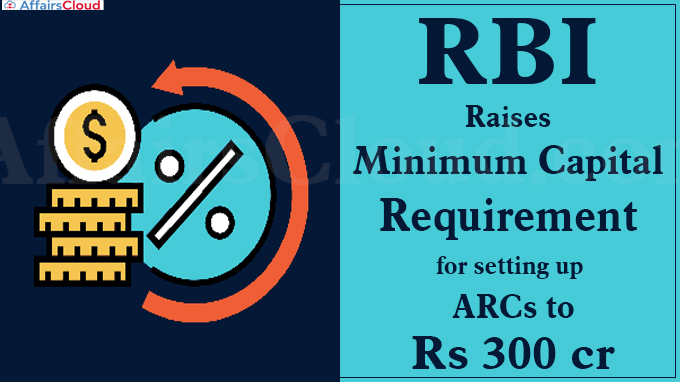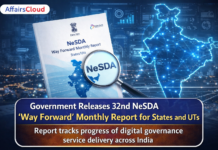 On October 11, 2022, the Reserve Bank of India (RBI) raised the minimum capital requirement for setting up an asset reconstruction company (ARC) to Rs 300 crore from the existing Rs 100 crore.
On October 11, 2022, the Reserve Bank of India (RBI) raised the minimum capital requirement for setting up an asset reconstruction company (ARC) to Rs 300 crore from the existing Rs 100 crore.
- The existing ARCs are need to meet minimum net owned fund (NOF) requirement of Rs 200 crore by March 31, 2024, and Rs 300 crore by March 31, 2026.
- This decision is aimed at strengthening the securitization sector which plays a vital role in the management of distressed financial assets.
Background:
This increase in capital requirement is a part of the amendments in the extant regulatory framework for ARCs. These amendments are based upon the recommendations of the committee set up by the RBI to undertake a comprehensive review of the working of ARCs and recommend suitable measures for enabling ARCS to function in a more efficient manner.
RBI allows ARCs to Act as Resolution Applicants
As a part of the above mentioned amendments, and under the provision of Section 10(2) of the SARFAESI Act, 2002 (Securitization and Reconstruction of Financial Assets and Enforcement of Securities Interest Act), RBI also permitted ARCs to undertake those activities as a Resolution Applicant (RA) under Insolvency and Bankruptcy Code, 2016 (IBC) which are not specifically allowed under the SARFAESI Act.
- However, ARCs with a minimum NOF of Rs 1,000 crore are eligible for the same.
Key Points:
i.ARCs are currently not permitted to commence or carry on any business other than that of securitization or asset reconstruction or the business referred to in Section 10(1) of the SARFAESI Act without prior approval of the RBI.
ii.The ARC shall have a Board-approved policy regarding taking up the role of RA which may inter alia include the scope of activities, internal limit for sectoral exposures, etc.
Others Amendments in the regulatory framework for ARCs:
i.For ARCs, the tenure of Managing Director (MD)/ Chief Executive Officer (CEO) and Whole -time Directors (WTDs) should not be more than 5 years at a time and the individual should be eligible for re-appointment.
ii.No person can continue as MD/ CEO or WTD beyond the age of 70 years.
iii.ARCs will have to constitute an audit committee of the board comprising of non-executive directors only.
- The Audit Committee will have the same powers, functions and duties as laid down in Section 177 of the Companies Act, 2013.
iv.The settlement of dues with the borrower will be done only after the proposal is examined by an Independent Advisory Committee (IAC) consisting of professionals having technical/ finance/ legal background.
v.Stressed loans which are in default in the books of the transferors are permitted to be transferred to ARCs.
Click Here for Official Notification
Recent Related News:
i.On 2nd September 2022, the Reserve Bank of India(RBI) has launched the pilot for end-to-end digitalization of Kisan Credit Card (KCC) lending.. The project was developed by the Reserve Bank Innovation Hub (RBIH) in association with RBI.
ii.RBI selected HDFC Bank (in partnership with Sweden-based Crunchfish Aktiebolag) and Precision Biometric India Pvt. Ltd for the Test Phase of the ‘On Tap’ application facility for the theme ‘Retail Payments’ (1st Cohort) under RBI’s Regulatory Sandbox (RS). HDFC Bank is selected for its ‘Offline Retail Payments’, while Precision Biometric India Pvt chosen for its ‘InnaIT Key Solution for Banking’.
About Reserve Bank of India (RBI):
Governor– Shaktikanta Das
Deputy Governors– Mahesh Kumar Jain, Michael Debabrata Patra, M. Rajeshwar Rao, T. Rabi Sankar
Headquarters– Mumbai, Maharashtra
Establishment– 1st April 1935




